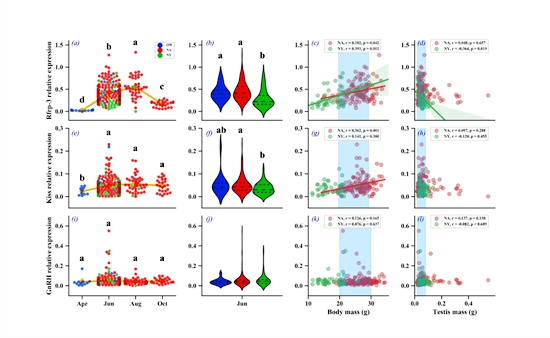Rodent Research Group reveals the molecular mechanism of hypothalamus in the regulation of seasonal breeding in Brandt’s vole
Recently, a paper entitled “Dynamic expressions of hypothalamic genes regulate seasonal breeding in a natural rodent population” was published on Molecular Ecology from the Rodent Research Group at IPP-CAAS. This paper reported for the first time the evidence about the molecular mechanisms to regulate seasonal breeding from wild rodent population. The work verified the role of key hypothalamic genes in this process and revealed the molecular bases of age-dependent reproductive strategies, which provided new ideas for the research of antifertility control of pest rodent.
Pest rodent species have high reproductive rate, and thus the regulatory mechanism of reproduction is a hot topic in rodent control. Brandt’s vole (Lasiopodomys brandtii) is a small, non-hibernating, herbivorous, and social rodent that is mainly distributed in the steppes of Xilingol and Hulunbuir in China. From the 1980s to the beginning of this century, its outbreaks caused serious damage to steppe vegetation. Following overt seasonal changes of its habitat, Brandt’s vole shows strong seasonal breeding and its populations size increases dramatically from spring to autumn. However, the molecular mechanisms driving the processes of seasonal breeding remain unclear.
In this paper, the authors found that from breeding season (April) to non-breeding season (October), adult male voles displayed a synchronous peak in gonadal activity with annual day length around summer solstice, which was jointly caused by age structure shifts and age-dependent gonadal development patterns. Overwintered males maintained reproductive activity until late in the breeding season, whereas most newborn males terminated gonadal development completely, except for a minority of males born early in spring. Consistently, the synchronous and opposite expression profiles of Dio2/3 suggest their central function to decode photoperiodic signals and to predict the onset of the non-breeding season. Moreover, changes in Dio2/3 signals may guide the actions of Kiss-1 and Rfrp-3 to regulate the age-dependent divergence of reproductive strategy in wild Brandt’s vole. Our results provide evidence on how hypothalamic photoperiod genes regulate seasonal breeding in a natural rodent population.
This research was supported by the National Nature Science Foundation of China (31471790, 31000858, 31101455) and the National Basic Research Program of China (2007CB109104).
More details can be found in the link below:
https://onlinelibrary.wiley.com/doi/10.1111/mec.15161


By Wang Dawei (dwwang@ippcaas.cn)
-
 Apr 18, 2024Opening Ceremony of the Training Workshop on Wheat Head Scab Resistance Breeding and Pest Control in Africa Held in CAAS
Apr 18, 2024Opening Ceremony of the Training Workshop on Wheat Head Scab Resistance Breeding and Pest Control in Africa Held in CAAS -
 Apr 03, 2024IPPCAAS Co-organized the Training Workshop on Management and Application of Biopesticides in Nepal
Apr 03, 2024IPPCAAS Co-organized the Training Workshop on Management and Application of Biopesticides in Nepal -
 Mar 28, 2024Delegation from the School of Agriculture and Food Science of University College Dublin, Ireland Visit to IAS, CAAS
Mar 28, 2024Delegation from the School of Agriculture and Food Science of University College Dublin, Ireland Visit to IAS, CAAS -
 Mar 25, 2024Director of World Food Prize Foundation visited GSCAAS
Mar 25, 2024Director of World Food Prize Foundation visited GSCAAS -
 Mar 20, 2024Institute of Crop Sciences (ICS) and Syngenta Group Global Seeds Advance Collaborative Research in the Seed Industry
Mar 20, 2024Institute of Crop Sciences (ICS) and Syngenta Group Global Seeds Advance Collaborative Research in the Seed Industry
